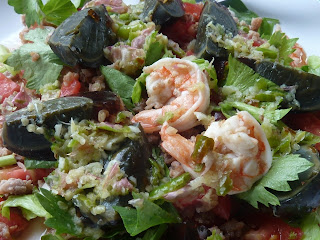Sie haben viele Namen: Jahrhunderteier, hundert- oder gar tausendjährige Eier, und auf Thai sogar „Eier in Pferdepippie“ – und dann noch diese schwarzgrüne Farbe! Nein, wie kann man das nur mögen!
Tja, „man“ kann. Ich bin sozusagen ganz verrückt danach, seitdem ich diese schwarzen transparenten Eier vor mehr als 30 Jahren ganz oben im Norden in einem Dorf bei Chiang Rai das erste Mal angeboten bekam. Damals wurden sie einfach mit diesem rosa (also eingelegten) Ingwer serviert und sie haben köstlich geschmeckt. Und ausserdem haben sie toll ausgesehen, finde ich.
Etwas später habe ich dann entdeckt, dass es einen sauerscharfen Salat (Yam) davon gibt. Ich bestellte den in einem Restaurant in Bangkok, und nie gab es ihn – bis ich dann endlich mitbekam, dass man dachte, ich würde den sofort wieder ausspucken, weil ich nicht wüsste, was das ist. Also war er halt (für mich) nicht da. Als ich ihn dann bestellen durfte (weil ich den thailändischen Namen wusste), schmeckte er sehr lecker.
Aber, den allerbesten Yam Khai Jieau Maa habe ich in Prachuap Khiri Khan gegessen. Um ihn selbst so hinzubekommen, muss ich noch etwas üben und etliche Male zum Probeessen hinfahren – was überhaupt nicht schlimm ist, denn Prachuap ist eine wunderschöne Stadt mit einem tollen Strand, der Ao Manao – Bucht.
Diese Version hier ist schon ganz gut geworden, leider aber nicht die Fotos. Ich musste mich nämlich wahnsinnig beeilen, weil ein heftiger Regenguss anstand – und meine süsse kleine halboffene Küche hat noch keinen ordentlichen Regenschutz. Aber egal, ich werde das Rezept trotzdem schonmal aufschreiben.
There are many names for these eggs: “Century eggs”, “hundred-year old eggs”, and even “thousand-year old eggs”. In Thai they are (literally) “eggs in horse pee” - how could anyone like them! And there’s the black - greenish color, too!
Well, I can. Since I first tasted them I’ve been nuts about them. This happened more than 30 years ago, and these transparent black eggs were offered to me in a village far north of Chiang Rai. They were served simply with pink pickled ginger, had they an extraordinary taste, and looked marvelous!
Sometime later I found that there is a sour and spicy salad made from them. A number of times, I tried to order this Yam (salad) in a Bangkok restaurant – but was never successful. Eventually, I understood that the restaurant didn’t think I knew what I was ordering and would be disgusted. It was just easier to pretend they didn’t have it: “No have”. When I finally succeeded ordering it (because I’d learned the Thai name), I liked it a lot.
But the very best Yam Khai Jieau Maa I ever had, I got in Prachuap Khiri Khan. To make it as good, I still have to practice a lot and take food trips to the town for comparison – which I like to do anyway, since Prachuap is lovely, with a beautiful beach, the Ao Manao Bay.
The version of the salad which I’ll show you here is quite good, though perhaps not up to the Prachuap standard. It’s too bad that the pictures aren’t as good. I had to finish the salad in a hurry - a big rainstorm was coming, and my cute little (almost) outside kitchen doesn’t have good rain protection yet.
Anyway, here is the recipe. Enjoy!
Sauerscharfer Salat aus hundertjährigen Eiern – Yam Khai Jiau Maa – ยำไข่เยี่ยวม้า
2 Portionen
Salat
2 hundertjährige Eier, sorgfältig geschält und geviertelt
3 EL Schweinehack
8 frische Garnelen, entdarmt und geschält
4 Stängel asiatischer Sellerie, in Stücke von ca. 5 cm zerteilt
3 Thai-Schalotten, in dünne Scheiben geschnitten
2 Tomaten, in Spalten
Etwas Ingwer, in feine Streifen geschnitten
1 EL Erdnüsse, geröstet und grob zerhackt
Einige Salatablätter, als Garnitur
Einige Zweige Koriander, als Garnitur
Sauce
5 Knoblauchzehen, gehackt
1 EL Chilies, gehackt (Prik Kee Nu)
2 EL Limettensaft
2 EL Fischsauce
1-2 EL Palmzucker
Eine Pfanne erhitzen, das Fleisch darin anbraten, bis es durch ist. Dann Garnelen zufügen und weiterbraten, bis sie rosa sind. Das geht recht schnell. Immer schön rühren. Auf einem Teller zur Seite stellen.
Zucker, Limettensaft und Fischsauce verrühren, bis sich der Zucker aufgelöst hat. Abschmecken, die Sauce soll kräftig gewürzt sein, denn sie wird ja durch die anderen Zutaten noch verdünnt. Knoblauch und Chilies zugeben.
Jetzt die Sauce mit Schweinefleisch und Garnelen mischen, Schalotten, Sellerie, Erdnüsse und Tomaten auch zugeben.
Eine Platte oder einen grossen Teller mit Salatblättern auslegen, darauf die Fleischmischung verteilen. Die Eierviertel darauf anrichten und das Ganze mit Ingwer bestreuen und Korianderzweige dazulegen. Fertig.
Century Egg Salad – Yam Khai Jiau Ma – ยำไข่เยี่ยวม้า
Serves 2
Salad
2 Century eggs, carefully peeled, quartered
3 tbsp minced pork
8 fresh shrimps, cleaned, peeled, deveined
4 stalks Chinese celery, cut in 5 cm pieces
3 Thai shallots, thinly sliced
2 tomatoes, cut into wedges
Some ginger, julienned
1 tbsp roasted peanuts, coarsely chopped
Some salad leaves, to garnish
Some sprigs cilantro, to garnish
Dressing
5 cloves garlic, chopped
1 Tbsp chilies, chopped
2 Tbsp lime juice
2 Tbsp fish sauce
1-2 Tbsp palm sugar
Heat a pan and cook pork until done, add shrimps and cook until they turn pink. Put on a plate and set aside.
Mix sugar, lime juice and fish sauce and stir until the sugar dissolved. Taste the sauce and make sure it has a strong flavor, because the other ingredients will be added. Add garlic and chili.
Now mix the sauce with pork and shrimps as well as with shallots, celery, peanuts and tomatoes.
Arrange salad leaves on a plate, add the above mixture, top with quarters of century eggs, sprinkle with julienned ginger, garnish with some sprigs of cilantro if you like, and serve.
.


























